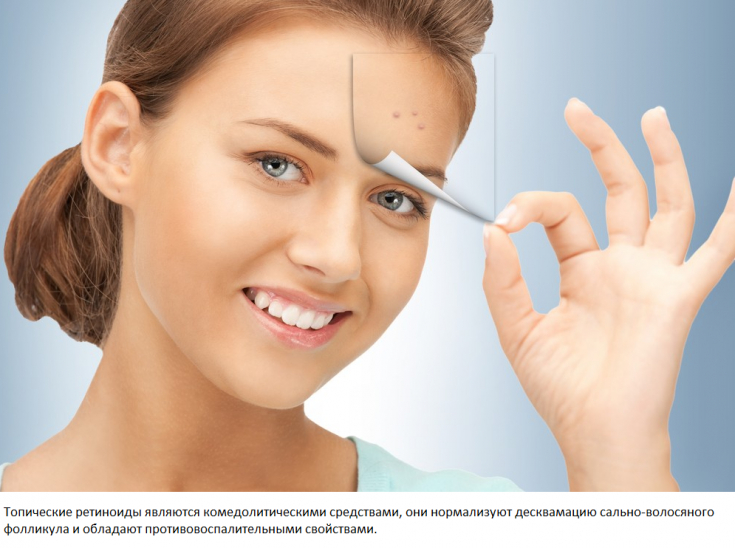Acne is a serious medical problem and can significantly reduce the quality of life of people. Profuse acne is the cause of low self-esteem, communication difficulties and even depression.
Therefore, effective acne occupies an important place in the field of modern cosmetology and dermatology.
According to international treatment protocols, topical retinoids are the drugs of choice and should be used for all degrees of acne severity as a topical treatment of the disease.
In this article on estet-portal.com, we review the clinical efficacy and safety of topical retinoids in the treatment of acne.
Topical retinoids: comedolytic and anti-inflammatory properties
Topical retinoids are used as the primary treatment for acne and are included in most therapeutic regimens.
Topical retinoids are comedolytics, they normalize desquamation of the sebaceous hair follicle and have anti-inflammatory properties.
Three topical retinoids are currently used in acne management: tretinoin, adapalene, and tazarotene.
All topical retinoids have a mild photosensitizing ability, but sunscreen can easily handle this situation.
Follow us on Facebook
Clinical Efficacy and Safety Study of Tretinoin
Tretinoin – topical retinoid, a structural analogue of vitamin A.
In clinical studies, tretinoin has been shown to reduce comedones and improve overall skin condition.
When using tretinoin as monotherapy for acne (as a 0.025% gel), a 40% reduction in the number of acne lesions from baseline was noted on day 84.

Follicular biopsy results showed that the use of 0.025% tretinoin gel resulted in a 50% reduction in microcomedones at 6 weeks and 80% at 12 weeks of treatment.
Standard tretinoin preparations cannot be co-administered with benzoyl peroxide preparations.
The use of retinoids in the treatment of acne: to be or not to be
Adapalene: evidence-based clinical efficacy of a topical retinoid
Adapalene – topical retinoid, a synthetic analogue of retinoic acid. Comparative trials have shown that adapalene 0.1% gel has similar efficacy to tretinoin 0.025% gel but has a better safety profile.
In a randomized clinical trial, 0.3% adapalene gel was more effective than 0.1% adapalene gel (reducing total acne by 45.3% and 41.8%, respectively).
Unlike tretinoin, adapalene is light stable and can be used with benzoyl peroxide.
In patients with moderate to severe acne, 0.3% adapalene gel plus 2.5% benzoyl peroxide was superior to 0.1% adapalene gel plus 2.5% benzoyl peroxide. On average, a 68% reduction in the number of rashes compared with baseline was noted with the use of combination topical therapy.
Skin and retinol: how to use retinoids correctly so as not to harm
Tazarotene: efficacy and safety of topical retinoid
Tazarotene – a third-generation topical retinoid that has the best efficacy compared to tretinoin and adapalene. This drug has also shown to be effective in treating psoriasis.
Tazarotene is the only retinoid classified as a "pregnancy category X" drug. (i.e. may be teratogenic and should not be used by pregnant or breastfeeding women).
More studies on the safety profile of tazarotene are required. This topical retinoid is currently not available in all countries.
Thus, topical retinoids – these are topical agents that are evidence-based and should be used as first-line treatments for acne.
Thank you for staying with estet-portal.com. Read other interesting articles in the "Cosmetology" section. You may also be interested in Retinoids in cosmetics
Translated from The New England Journal of Medicine







Add a comment